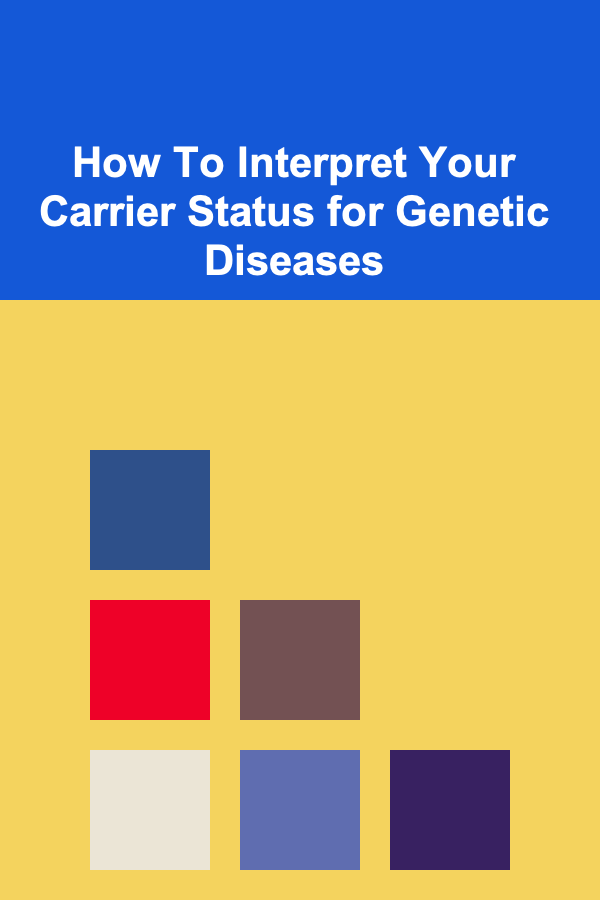
How To Interpret Your Carrier Status for Genetic Diseases
ebook include PDF & Audio bundle (Micro Guide)
$12.99$11.99
Limited Time Offer! Order within the next:

Genetic testing has become an essential tool for understanding one's health risks, with a special focus on identifying carriers of genetic diseases. As we delve into the complex world of genetic inheritance, it's crucial to interpret the results of carrier screening with care, as it can significantly impact individuals' decision-making processes concerning their health, family planning, and future prospects.
Carrier screening is the process of determining whether an individual carries a gene for a recessive genetic disorder. A carrier is someone who has one copy of a mutated gene that could cause a genetic disease but does not exhibit the symptoms of the disease themselves. If both parents are carriers of the same recessive disorder, there is a risk that their child may inherit two copies of the mutated gene, one from each parent, leading to the development of the disorder.
This article explores how to interpret carrier status for genetic diseases, the importance of genetic counseling, and the broader implications of genetic testing in health and family planning.
Understanding Carrier Status
What Does Carrier Status Mean?
When someone is said to be a carrier of a genetic disease, it means they have inherited one mutated gene from one parent but a normal gene from the other parent. In most cases, carriers do not experience symptoms of the condition associated with the mutation because a single healthy gene is enough for the body to function normally. However, carriers have the potential to pass the mutated gene on to their offspring.
In the context of recessive genetic diseases, both parents must be carriers of the same mutated gene for there to be a risk of their child inheriting the condition. This is because recessive diseases only manifest when an individual inherits two copies of the mutated gene, one from each parent. If only one parent carries the mutated gene, the child will generally be a carrier like the parent but will not have the disease.
Types of Genetic Diseases and Carrier Status
Genetic diseases can be classified based on their inheritance pattern, and carrier status interpretation varies depending on the type of inheritance. The most common types include:
- Autosomal Recessive Diseases: These are caused by mutations in genes located on non-sex chromosomes. A person must inherit two copies of the mutated gene (one from each parent) to develop the disease. Examples of autosomal recessive diseases include cystic fibrosis, sickle cell anemia, and Tay-Sachs disease. Carriers of these diseases typically do not show symptoms but can pass the mutated gene on to their children.
- Autosomal Dominant Diseases: In contrast to recessive diseases, autosomal dominant diseases require only one copy of the mutated gene to cause disease symptoms. An individual with a dominant genetic disorder has a 50% chance of passing the mutation to their children, regardless of whether their partner is a carrier. Examples of autosomal dominant diseases include Huntington's disease and Marfan syndrome.
- X-linked Recessive Diseases: These disorders are linked to the X chromosome, one of the sex chromosomes. X-linked recessive diseases primarily affect males, as they only have one X chromosome. Females, having two X chromosomes, may be carriers without showing symptoms, as they have a second, normal X chromosome. Hemophilia and Duchenne muscular dystrophy are examples of X-linked recessive diseases.
Each of these categories requires different approaches to understanding carrier status and the associated risks for offspring.
The Role of Genetic Testing
Genetic testing for carrier status involves analyzing an individual's DNA to detect whether they carry specific mutations linked to recessive diseases. This is typically done through a blood test or a cheek swab, which provides a sample for DNA analysis.
Carriers of genetic diseases may be identified through routine screening or as part of preconception or prenatal genetic counseling. For instance, couples planning to have children may choose to undergo carrier screening to assess whether they are carriers of any inherited conditions, particularly those that could impact their offspring.
In some cases, individuals may already know that a family member has a genetic disorder, prompting them to undergo carrier testing. For others, testing may be part of a routine health check-up, especially if there is a known history of genetic diseases in the family.
Interpreting Your Results
Once genetic testing is complete, the results typically indicate whether or not you are a carrier of a particular genetic mutation. Understanding these results is critical, especially when deciding about family planning and health interventions.
Carrier Negative vs. Carrier Positive
- Carrier Negative: If the test results indicate that you are not a carrier of the genetic mutation for a particular disease, it means that you have two normal copies of the gene in question. This implies that you are not at risk of passing the disease to your offspring (unless your partner is a carrier, in which case there may still be some risk of the child inheriting the disease).
- Carrier Positive: A positive result indicates that you carry one copy of the mutated gene. While this does not mean that you will develop the disease, it does mean you are capable of passing the mutated gene to your children. If your partner is also a carrier of the same gene, there is a 25% chance that your child could inherit both copies of the mutated gene and develop the disease.
What Happens When Both Partners Are Carriers?
If both you and your partner are carriers of the same recessive genetic disease, it is essential to understand the potential risks for your children. When both parents are carriers of the same genetic mutation, their children have a:
- 25% chance of inheriting two copies of the mutated gene (one from each parent) and thus developing the genetic disease.
- 50% chance of inheriting one normal gene and one mutated gene, making them carriers like their parents but not affected by the disease.
- 25% chance of inheriting two normal genes and being unaffected by the disease.
In this case, genetic counseling is highly recommended to explore potential options, such as pre-implantation genetic diagnosis (PGD) during in vitro fertilization (IVF) or the possibility of prenatal testing to assess whether the baby carries the condition.
When Should You Seek Genetic Counseling?
Genetic counseling is a vital resource when interpreting carrier status results. Genetic counselors are trained professionals who can help individuals and families understand the implications of genetic testing, the risks for offspring, and potential next steps. They can provide support in making decisions about family planning and reproductive options.
Some scenarios in which genetic counseling is recommended include:
- When both partners are carriers of the same recessive genetic disease.
- When a person has a family history of a genetic disease and wants to understand their carrier status.
- When an individual is pregnant or planning a pregnancy and wants to assess the risks of passing on a genetic disorder.
Broader Implications of Carrier Screening
Family Planning Decisions
Carrier status plays a crucial role in family planning. For couples planning to have children, understanding carrier status can provide valuable information about the likelihood of passing on genetic diseases. In cases where both partners are carriers of the same recessive disease, couples may decide to explore reproductive options such as:
- Prenatal testing: Testing the fetus for genetic diseases, often through amniocentesis or chorionic villus sampling (CVS).
- Pre-implantation genetic testing: This involves testing embryos for genetic conditions before they are implanted in the womb during in vitro fertilization (IVF).
Additionally, some couples may opt for adoption or use of donor gametes if they wish to avoid the risk of passing on a genetic disorder.
Psychological and Emotional Considerations
Carrier testing can have profound psychological and emotional impacts. The knowledge of being a carrier of a genetic disorder may raise concerns about the potential for passing on a disease to future generations. This information can also affect how individuals perceive their own health risks, particularly if they are at risk for developing a genetic disease in the future.
Moreover, for individuals who are carriers of a genetic disease that affects children, there may be feelings of guilt or concern about their ability to ensure the health and well-being of their offspring. Genetic counseling can be helpful in addressing these emotional and psychological challenges.
Ethical and Social Implications
The rise of genetic testing raises important ethical and social questions. As genetic technology continues to evolve, there are concerns about privacy, discrimination, and the potential for misuse of genetic information. For example, some worry that employers or insurance companies could use genetic data to discriminate against individuals, while others are concerned about the potential for genetic testing to reinforce social inequalities.
As genetic testing becomes more widespread, it will be crucial to establish safeguards to protect individuals' genetic information and ensure that it is used responsibly and ethically.
Conclusion
Interpreting carrier status for genetic diseases is a complex process that requires a thorough understanding of genetics, inheritance patterns, and the potential implications for family planning and health decisions. While genetic testing provides valuable insights into the risks of passing on genetic disorders, it is essential to approach the results with caution and to seek professional guidance from genetic counselors.
As genetic testing becomes increasingly accessible, it is important for individuals to be informed about their genetic risks and to take an active role in making decisions that align with their values and aspirations for the future. With the right support, individuals and families can navigate the challenges of carrier status and make empowered, informed decisions about their health and well-being.

How to Conduct Wildlife Disease Surveillance
Read More
How to Create an Effective Office Supply Inventory
Read More
How to Maximize Returns Using Dividend Stocks
Read More
How to Renovate Your Home on a Tight Budget
Read More
How to Tackle Pet Hair Around the House
Read More
Creating a Profitable App: A Comprehensive Guide
Read MoreOther Products

How to Conduct Wildlife Disease Surveillance
Read More
How to Create an Effective Office Supply Inventory
Read More
How to Maximize Returns Using Dividend Stocks
Read More
How to Renovate Your Home on a Tight Budget
Read More
How to Tackle Pet Hair Around the House
Read More